I parked in the packed gravel driveway that had become only barely distinguishable from the yard, due to weeds poking through the rocks. I glanced at my watch. My flight was early and I’d made good time coming up from the city. The realtor wasn’t going to be here for another hour. I got out of the rental car and stretched. After the air-conditioned ride, the 100 degree heat and 100 percent humidity hit me immediately. It was “hawt.” My tee shirt felt like I had just taken it out of the washing machine. Welcome to July in Wilbur, Vermont.
I stared at the house for a while without moving. It seemed so big when we were young. The gloss white paint was faded and gone. But the porch that ran the front of the house wasn’t sagging. A section of rail had recently been replaced. My mother’s Portland roses were unkempt but in full bloom, ranging from delicate pink to purplish crimson and was that vermillion? Or was vermillion a green? I never got fancy color names. She used to go through plant catalogs like my brother and I went through the Herter’s catalog. Everybody sitting around the table and dreaming, my dad letting us order a few molds to make rubber worms, a few flowers for the planter boxes running the length of the porch, now empty.
I was lost for a moment in nostalgia. When we were young this was such a happy place. Our parents provided a protected haven for us on this farm. My brother and I were in a lucky generation, born as one war was ending, and thinking war was a thing of the past. My mom was a retired concert pianist who filled our lives with art and beauty. My dad was a country doctor and sustenance farmer on the side, who, in his taciturn way, taught us science and the kind of Yankee problem solving that kids just don’t get from screens these days. I looked at my hands, gone soft in the office. But I never met a small engine I couldn’t get running, nor did I have any handymen in my contacts list. I owed him that, at least.
When we left and went to college, and later left home for good to start our careers, it was with hope and naiveté. After that, seems like every time I had returned it was to tragedy. First my mother, who wasted away with cancer. I was so mad that our dad hadn’t told us – had robbed us of those last crucial years, days, and hours – I left and didn’t speak to him ever again. After she passed, he retired. Then he took a fall in the barn, and was too broken to work the farm any more. But rather than him leave the farm, my brother Rob had sold his practice and moved back. He was broken too, in his way, his son lost half way around the world to an IED in a war that had just missed us but landed with a vengeance on the next generation. All they sent home were his dog tags. I’m not sure what got Rob. They said it was a heart attack. I just think after Dad passed Rob’s broken heart had no reason to keep beating. I certainly didn’t give him one. I could’ve handled it better, but at the time I had my own problems, although I couldn’t remember what they were at the moment standing here and facing my past and my present rolled into one.
I walked across a yard two feet deep in sparse grass gone to seed and stepped onto the porch. The robin’s egg blue of the ceiling stood in stark contrast to the walls. Still vibrant and unpeeling. I smiled. That was my mom. Said with a blue porch ceiling it was always a sunny day, no matter how stormy the skies were. She was always full of optimism and light. I could sit on the porch swing and stare up, and my troubles would melt away. It was years later I learned the real reason porch ceilings were blue: to keep away evil spirits that could not cross water.
I did not make it to the house. They say that scent causes the strongest memories. The hot summer air was redolent of my mother’s lilacs on the side of the yard, the roses running along the porch, the scent of hot grass seeding out. So I don’t know if the scent triggered the memory, or if it was the rod rigged up and ready to fish leaning by against the railing, but when I picked it up, I was immediately transported back to the summer of ’78.
Time is a river in which you cannot wade upstream. Sometimes a memory will come floating by, occasionally you will get flooded. That summer, which I had not thought about in years, came rushing back. That was the summer we learned to fly fish. Sure, we had been drowning worms on saplings since Mom let us loose in the woods, but we wanted to be like Dad. We wanted to be elegant fishermen. We were consumed by the mystique after having poured through the Fireside Book of Fishing Tales. He spent a few years saying it was too hard and frustrating for small boys, but about the time we started painting the house, an unending summer job that would last until we went to college, he relented.
One day a long package came in the mail from Herters, addressed to my dad. We were jumping up and down with excitement, but he made us wait until after dinner to open it. I smiled at memories of my mom chiding him about it. It was a two-piece fiberglass set up, a spin-fly rod combo. It cost $15 and came with a line, reel, and leader. But it was a Winston to us.
My dad taught us the basics in the yard and then gave us one fly, with instructions to barb the hook, and not to lose it. There's a lot of lessons there for a 14-year-old boy and his 12-year-old brother. This was my dad's way. He didn't have much time to spend with us in the summers when we could use it most, but he was still there every day through his words and wisdom. He said, “If I teach you, you will only learn so much. But anything you figure out for yourselves, you own the heart of it.” Left to our own, we found some books in the library and figured the rest out as we went. The currency of youth is time, and that summer we had not yet spent it. We had all the time in the world to ponder the mysteries of trout in their hidden kingdoms.
That was also the summer my mom got her first point-and-shoot camera. Mostly, I did the fishing, and Rob ran around snapping photos (often without film in the camera) and giving a running commentary of our actions like Ned Martin calling the Red Sox play-by-play on the radio. My mom insisted on listening to the games on the radio, although we had gotten a color TV the year before. She liked to imagine them in her head and let the announcer paint a picture for her. There was a time I could not turn on the radio without thinking of her, sitting on the porch shelling beans or shucking corn, listening to the games on a summer afternoon with a smile. Me and Robbie playing ball in the yard, my dad sometimes doing a stint as pitcher. Would that those days had lasted forever.
"I don't know if you can see that, Jim, but it looks like there is a trout rising over against the bank. Probably taking hoppers. Big John Voelker is preparing his cast. Too bad the only fly he has is a Royal Wulff, but it looks like he's going for it. He's kneeling in the grass, that's going to make his back cast a bit tough – oh, a shame, he's snagged it!" Sometimes he cracked me up, sometimes I wanted to kill him, but he always helped me look for the flies.
The memory made me smile. Robbie was so full of life. My anger had almost erased my past, but holding that rod brought back all of the good parts of it.
We didn't catch a lot of fish at first, but we were really learning an awful lot about “the heart” of fishing and eventually the odd trout would come to whatever the "fly of the day" was on the stream that wound through our farm. I don’t know if it ever had a name. We called it “the creek.” It flowed from the foothills of the Green Mountains, east through deep shade of a hardwood forest, and across the meadow alongside the back of our property before it eventually wended its way to the Connecticut, as all streams on our side of the state did, I suppose. It ran cold even in the hottest days of summer, and held an unending number of trout. Which was good, because then we often ate what we caught.
One day we were kneeling in the tall grass watching a fish rise against the far bank. He was definitely the biggest fish we’d ever seen, I’m remembering him at two feet, so he was probably all of half that. Which is still a respectable wild brookie. We’d seen him the day before, but in my buck-fever haste, I muffed the cast and lost our one fly on the back cast. We’d searched for hours before returning home dirty and scratched. We didn’t have to say anything, my dad knew immediately we’d lost the fly. I thought I’d caught it in the grass, Robbie swore he heard the distinctive whip-crack of a poorly timed cast, but either way it was gone.
Dad strung us out for a while, but the next morning after we had scraped the south side of the house until the sun got on it, he came around the corner with another fly. It was a Parachute Adams, I think. As soon as we thanked him, we grabbed the rod and ran all the way to the back of the property, rigged up, and waited for our leviathan.
Old Nell, the nag that had been put out to pasture about when I was born would follow us along the stream. I realize now that there is nothing crueler for a herd animal than to be alone for the rest of her days, but she was the last plow horse in town, and when nobody else would take her from the neighboring farm, my dad walked her home one day. It was that or the glue factory. At least, that’s how I remember my mom telling the story. She called Dad “her old softie.” Nell was too old to ride, and sway backed, but she would follow us like a dog, and we usually had an apple or a carrot for her. We were her herd, I guess.
This day she came up like she always did looking for a treat, but we were too focused on the fish to notice. It was only fair that Robbie had first crack since I lost the fly the day before. I posed with the camera, and he began to cast, standing up and approaching the fish from downstream, his shadow falling behind him on the grass. I think he was always the better and more natural fisherman. I thought he had the distance, but he stripped another handful of line and made one more false cast.
Robbie’s arm shot forward and that’s when we heard a squeal behind us. He’d hooked Nell, who was grazing in his backcast, and she took off running. To his credit, he took her to the backing, but then he lost his grip on the rod as she went galloping across the field. I stood open-mouthed. I had no idea she could gallop. She was out of sight in seconds. We ran after her but the grass was over our heads. We called until we were hoarse, but again we returned home for dinner grubby, exhausted, and defeated. There was our dad, with the horse and the rod.
All he said was “I thought I told you to barb the hook.” We then got a lesson on how to push the hook through and cut it off. He handed Nell’s lead rope to us. “I think you need to spend some time apologizing. Best to curry and brush her before supper. She was wet through when I got her.” Then he handed us an apple and went in to wash up. We were more than happy to groom Nell, whom we thought to never see again. For the rest of her days, I was especially kind to her. I smiled at our shenanigans and looked around as if Nell would somehow be standing there.
The rod had lost a few guides, so we pooled our allowance and ordered a repair kit from Herter’s. That’s how you did it then. You fixed what you broke. And there was no ordering on the phone or online. Counting the time we had to mail them the money and the order, the time it took to fill the order and mail it back, we lost a month of summer. I have never failed to barb a hook again, even if I was fishing for the pan and not releasing them.
That memory lasted the whole way to the stream, and I had not thought to marvel that the path was still there and well-trod. Apparently, Rob had been visiting his own memories. I stood there for a long time, thinking about that summer. About when we were all together and happy. Finally I looked down at the rod in my hand. It was a 2x4 compared to the rods I’d held since, closer in lineage to the sapling poles we started with. But it held magic in our youth, and stored magic for us in our old age. Just holding it had brought back memories I had thought long forgotten.
I looked up to see a rise, and then another. The fly on was some variation of an Adams. Maybe even something my dad had tied. It didn’t make much difference, as I unhooked it and started to false cast it, I heard Robbie calling the plays in my mind. “And he’s in the box. He lets the first one go by, Ball! But he has all day, just waiting for the pitch he can put over the Green Monster…”
I let fly, surprised that I remembered the timing of the old rod, and it was as sweet as any cast I’d made since the last time I held it. It floated in the still summer air like a fly ball headed out of the park, with as much purpose and direction but with enough time to leisurely round the bases and watch it go, as amazed by the action itself as the outcome.
The fly landed as softly as the tears running down my cheek. Tears I had not cried in this century. Tears for all the memories I made, and all the memories I failed to make. I was so lost in the moment, that when the trout hit the fly I would’ve lost him, but brook trout are such voracious predators he hooked himself. I fought him for a few minutes, and brought a gorgeous fish to hand, as fat as a little tuna. I marveled at him and his constellations of spots. A splendid galaxy painted on his sides, so similar and yet so different from many of the fish I had caught. The effect was heightened by his background color being indigo, not olive. Like a great work of art, this little masterpiece in my hand transcended all time while evoking all of space. I released him and stood up, roll casting out the line and reeling it in. I looked across the stream with unfocused eyes and whispered “Thank you.”
Standing here, I had finally come home. Not just in my body, but something dropped into place in my soul, like the last tumbler in a lock, finally able to open up and be here in a way I hadn’t been able to be anywhere in decades. The anger that defined me was gone. I couldn’t even remember it, this thing that had held me for years like a fish in a net. Was it the tuft of feathers, the familiar scents, the unloading of the rod, the memories, the fish? Perhaps, a mélange of them all, I will never know. Nor, do I care. Time is a river, but it has many serpentine bends, and perhaps when the memory of pain rolls around the corner, we should not chase it. We should unbarb time’s hook.
When I came back up the path between the barn and the house, I felt 100 pounds lighter than when I had left. The Realtor was there. He had just finished hanging his sign from a newly planted 4x4 post in the front yard. Seemed like a lot of effort for traffic the road handled.
“Ah, there you are.”
“Sorry I’m late, I got,” I waved the hand not holding the rod, “caught up.”
He smiled ear-to-ear. “Oh I get it. Having your own trout stream, how can you beat that?”
“Indeed.” And we looked at each other for a moment, Yankee to Yankee, before he took down the sign with a wry smile. I shook his hand and he waved off my apologies before I headed back to the porch, put the rod down under that blue ceiling, and crossed to the door.

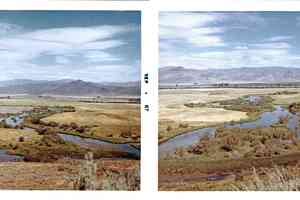
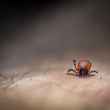
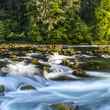
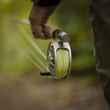
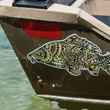
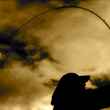
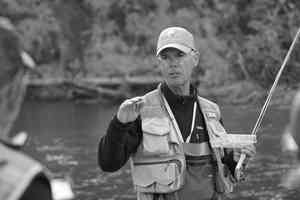
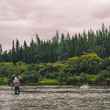


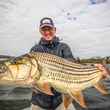
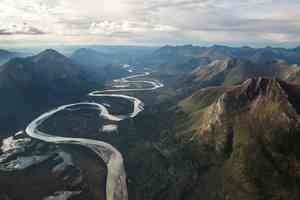

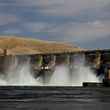
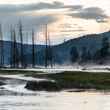
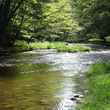
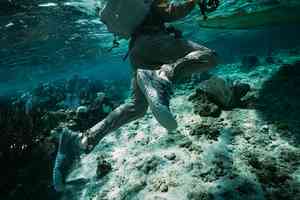
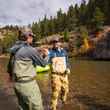
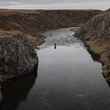
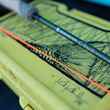
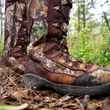
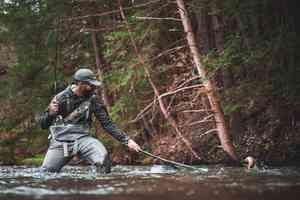
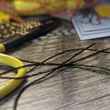
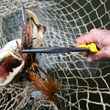

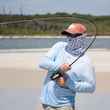
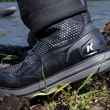
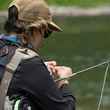
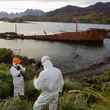
Comments